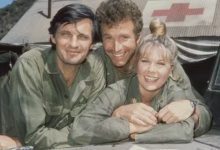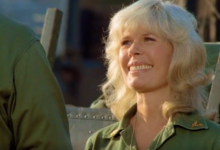Mike Farrell helped M*A*S*H mature as a series
Mike Farrell was the new guy for a while, but quickly went up in the ranks as M*A*S*H progressed.
In 1975, M*A*S*H faced what could have been a fatal blow when two of its most popular stars dropped out of the series. This left a noticeable void in the show that producers were quick to fix.
Wayne Rogers (Capt. Trapper John), Larry Linville (Maj. Frank Burns), and McLean Stevenson (Henry Blake) all left M*A*S*H at some point during the show’s 11-season run.
One of those replacement characters was Mike Farrell who stepped into the position of Capt. B.J. Hunnicutt in the 1975 season.
With a lot of patience, the crew adapted to the new cast changes, and so did the series’ many devoted fans. Audiences found that Farrell was the perfect fit and M*A*S*H found itself among the top 10-rated shows in the country, according to the Nielsen ratings.
At first, Farrell said he was nervous about fitting into an already established series, but he focused on growing his character and becoming a face everyone looks forward to seeing each week.
Capt. B.J. Hunnicutt changed a lot during his time in the 4077th, both outwardly with his very recognizable and sometimes controversial mustache and inwardly, with his morals and attitude.
“In the beginning, B.J. was clean cut, fresh from home, naive, but he was rapidly turned around,” Farrell said in a 1980 interview with Olathe News. “It’s an evolving process. As I see it, the show deals with the dehumanizing process, spiritual callous [sic] that can build up, and the efforts of the doctors and nurses to ward that off.”
“M*A*S*H has universality,” Farrell continued. “People don’t see it connected with the Korean War but with war in general, the degeneration of humanitarian attitudes and value of human life.”
People all over the world responded well to Capt. B.J. Hunnicutt. According to the interview, M*A*S*H could even be seen in many places across the world such as Hong Kong, Malaysia, and Western Europe. He had fans in many different area codes.
In Farrell’s mind, part of the reason M*A*S*H was such a success even with the character replacements was because of the emotion and realness the cast and crew put into their characters.
To make sure the show stayed mature, Farrell even wrote some of that emotion into the script himself. He wrote and directed some episodes, and was involved in a few other side projects during his time on the series.
“As we delve more into the characters, the show gets more thoughtful, and the comedy comes more from the human level,” Farrell said. “Most of the obvious gags were done in the beginning. Now we have to try harder, look deeper and come up with that emotional pull on one side, and a laugh on the other.”
According to another 1980 interview with the Green Bay Press-Gazette, Farrell said he felt that M*A*S*H matured quickly once he became part of the series. He said part of this was because of his and Alan Alda’s (Hawkeye) connection, both on set and off.
For many, it was as if we were watching a pair of old friends onscreen, even if he was the new guy in the 4077th.
“I keep hearing people say ‘Thank you’ as if I were responsible for the show,” Farrell said. “I’m not the guy who is responsible, I’m just part of it.”

